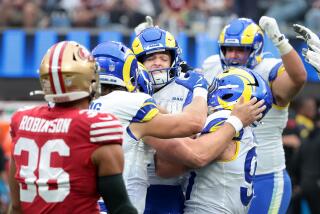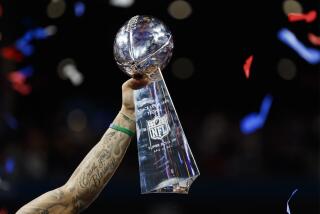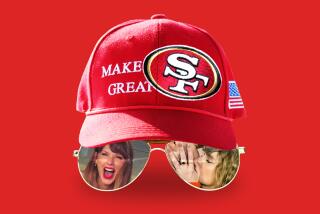Rams, Other Teams Leave Fans Seeing Red Again
You realize the Rams are to blame for this. The Rams and the Minnesota Vikings and the Philadelphia Eagles and Bill Parcells and Phil Simms.
We could have been saved from another San Francisco 49er Super Bowl. We won’t, but we could have been. There were people out there capable of sparing us from The Dreaded Red-- No! Not another pre-Super Bowl profile on Joe Montana! --but one by one, they all let us down.
The Rams: They had the offense to upend the 49ers this year, along with September approval of Sports Illustrated and Inside Sports. Such assessments, though, edited out one important passage: defense. So did the Rams, and by midseason, Anaheim’s Great Lite Hope was succeeding only in costing Fritz Shurmur his job.
The Vikings: They had the defense to upend the 49ers this year. Their offense, however, had Rich (No Cannon) Gannon at quarterback and failed to give Herschel Walker his wake-up call until November. The Rams and the Vikings should have talked merger.
The Eagles: By season’s end, this was the one team the 49ers secretly feared. In the Anaheim Stadium press box after San Francisco’s 26-10 pounding of the Rams in mid-December, 49er beat writers sat around and bemoaned the prospect of another Super Bowl week of recycling George Seifert anecdotes: “Only the Eagles can save us.” Then, Buddy Ryan pulled Randall Cunningham and Washington’s Ready-To-Be-Skinned team advanced to San Francisco instead. Buddy deserved to be fired.
Bill Parcells: What was he thinking when he went for the touchdown on fourth and goal with nearly five minutes left in a 7-3 game at Candlestick Park? Evidently, not the playoffs. Had Parcells opted for the field goal, his defense would have gotten the ball back in time for the Giants to try another. A 9-7 New York victory would have translated into the homefield advantage in the playoffs, which might have been enough to snow San Francisco’s overly pass-reliant offense Sunday.
Phil Simms: He got hurt. How dare him. Simms’ injured foot placed the Giants’ offense in the hands of Jeff Hostetler, and no Hostetler has ever quarterbacked a team into the Super Bowl. None ever will.
The obstacles are all but knocked down now. The last NFC opponent left standing is New York, which scored one field goal in its Dec. 3 meeting with the 49ers--and Simms and Rodney Hampton played in that one. Hampton, the rookie speed back who became a valuable complement to Ottis Anderson’s churning tree stumps, broke his leg Sunday against Chicago and now joins Simms on the sidelines.
Seven days from now, the rest of the Giants are due to follow.
Boredom used to be a state of mind, but today it comes in two colors: Red and gold. The ranks of the sick and tired have swelled with each passing January--Cincinnati in 1989, Denver in 1990, the entire country in 1991. Those initials on the 49ers’ helmets, since when did they come to stand for Super Forever?
At this point, there are two candidates left for America’s Team: Buffalo and the Raiders. To the winner of Sunday’s AFC championship game go the hearts of a nation. And this year, the winner of the AFC championship game might actually have a slingshot’s shot against San Francisco.
This was assured when Denver finished 5-11.
A 49er-Raider Super Bowl would be interesting, if only to see what Al Davis’ machinations would do to Top Secret Seifert, the coach who sees spies in eucalyptus trees, spies in his sleep, spies in his soup. Davis would give Seifert reason to really worry.
Just because you’re paranoid doesn’t mean somebody’s not watching you.
But as long as Jay Schroeder quarterbacks the Raiders, Buffalo remains the best chance for a San Francisco defeat in our time. With Jim Kelly, Thurman Thomas and Andre Reed, the Bills match up well at the skill positions and any defense that has Bruce Smith and Cornelius Bennett presents an intriguing challenge to the Montana Miracle.
(Note to the Rams: That Buffalo defense also features a cornerback named Clifford Hicks. I know you’re looking for help there . . . )
San Francisco-Buffalo. It would be a meeting of America’s best football teams, if not America’s best cities. It would make for an all-time study in civic contrast, reams of fodder for the pregame humorists and a billing that’s a natural during these early days of 1991.
Consider the modes of transportation for which both cities are known and there you have it: The BART-Simpson Super Bowl.


